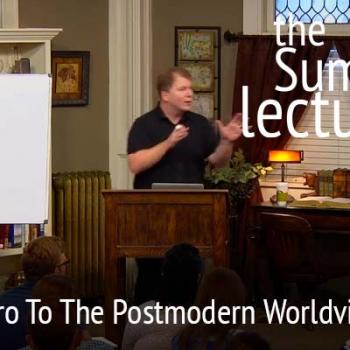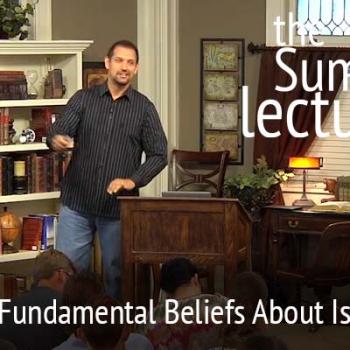
To purchase the entire DVD set of the Summit Lecture Series, visit summit.org.
As a Muslim, I had been taught that all Christians are veiled polytheists. They believe in multiple gods. They call it one so that they can the honor and dignity of being monotheistic, but they actually believe in three.
And they don’t know why.
And I lorded that over people! Anytime I would encounter a Christian, I would get excited. I viewed it as a great opportunity to tear down their faith. And I did this with many, many people.
This all changed when I entered college. I was at a speech and debate tournament – our first of the year. My teammate, David, and I ended up roommates at the hotel we were staying. That night, most of the team went out to blow off some steam. Some went out drinking, some went out to find something to smoke.
I stayed back because my parents had taught me that I must always remain above moral reproach. I felt that at all times, what I did in my life should bring glory to Allah.
What surprised me was that my friend, David, also stayed back.
So, we started talking, and while we were talking, he took out his Bible and started reading it.
I gleefully thought, “No way! I’ve got a Christian to take down tonight!”
“Don’t your realize that book is horribly corrupt?” I asked.
He replied, “What are you talking about?”
“Think about this… Jesus spoke Aramaic, right? And the early church spoke Hebrew. And then, when the New Testament was written, it was penned in Greek. So, by the time the New Testament was written, Jesus’ words were a translation of a translation. No translation is perfect. And, by the time it was written, the Christian church was merely a small group of people. Not until the fourth century when message spread to Rome and was translated into Latin – the Vulgate – was there a popular Bible in existence. Then, that version was around for 1,000 years as the “main Bible” before, through a German translation, the King James Version appeared on the world stage. And now, today, you have the KJV, the NKJV, the NASB, the NIV, the RSV, the ESV, the who-knows-what-V… you’ve got so many versions of “The Bible”, how am I supposed to know what the Word of God is?”
Here’s what I didn’t know about David:
David had spent the past five years doing nothing but studying apologetics and the Bible. However, he was incredibly shy and didn’t like engaging people. So, before we even began talking, he was praying, “God, You put me in a room with a Muslim. But, I don’t want to start a conversation. If You want me to talk to him, could You get him to start talking?”
So, he was ready.
“Nabeel, let me tell you something. The disciples lived in an area that was multi-lingual. Just because Jesus spoke Aramaic doesn’t mean that He didn’t speak other languages as well. And the disciples – if they spoke and understood Aramaic, they could have spoke, understood, and even written in other languages, including Hebrew and Greek. And this is not the same thing as ideas getting “lost in translation”, since people who are truly multi-lingual can express and write thoughts in multiple languages without error. So, at that point, you have a Greek New Testament, WHICH is reconstructed today with TOTAL accuracy. And, by the way, even if we didn’t have any of our 5,500 Greek New Testament manuscripts to reconstruct the New Testament today, we have over 30,000 ancient quotations of the New Testament from the Patristics, with which we can reconstruct almost the entire New Testament as well. Plus, there are ancient translations of the New Testament like Latin, Syriac, and Coptic.”
I looked at David and couldn’t help but say, “You are making this stuff up! I have talked to so many Christians, and not a single one has ever told me any of this.”
So, we became great friends. At that moment, we began a relationship where we would go at it with each other in theological debate, but we always remained friends.
For instance, he was studying Biology and Theology at the time, with the goal of ultimately getting his PhD in “The Problem of Evil” and I was studying pre-med. So, we had many classes together and continually helped one another with our studies as we also helped spur each other on to find Godly truth.
We truly were friends at the deepest and most trustworthy level. So, when he told me, “Nabeel, the Quran is not the word of God”, I wasn’t hearing “you’re inferior because your faith is incorrect”. Instead, I knew he was telling me, “Nabeel, I want to build you up in the truth. You’re wrong right now, so I want to share the truth with you.”
Likewise, I was trying to share Islam with him, trying to do the same thing – not trying to tear him down – and he knew it.
The key was and is Christian love in evangelism. I can’t stress that enough. Evangelism – sharing God’s truth – was never meant to be performed apart from the context of love. As John 13:35 says, “They will know you by your love.” In other words, if people – even Muslims – see you, and they’re not seeing love, then they are not seeing Jesus Christ.












